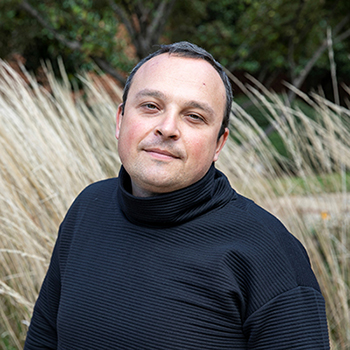In This Story

The conflict in Ukraine the world is observing now is nothing new to Anton Liagusha.
When gun-brandishing, Russia-backed separatists took over the Donetsk National University in Donetsk, Ukraine, in 2014, the country’s prime minister hastily relocated the school to a new campus in Vinnytsia, 20 hours away by train. Now the disused former diamond-cutting factory is the site of a university that is, technically, in exile.
“It was a very difficult time,” Liagusha said. Liagusha, an associate professor at the Schar School of Policy and Government, was one of 600 teachers at the university—his alma mater—who were forced to relocate. Some 150 professors did so, but only about 5,000 of the 18,000 students followed. With few students and a diminishing source of funding, Liagusha had one more relocation in his future.
Liagusha was selected to come to the Schar School for a year under the New University in Exile Consortium program, which assists endangered and persecuted scholars and provides them means to continue their teaching and research.
He is continuing his studies on media’s influence on politics and culture and how the public consumes information. A media studies scholar and a former radio journalist, Liagusha focuses on “fake news,” disinformation, and propaganda―topics for him that are far more than academic.
“It is an honor to have a world-class scholar such as Anton to serve on our faculty,” said Janine Wedel, a Schar School University Professor who studies corruption and was instrumental in bringing him to Mason.
“At a time of increased threats globally against academic and journalistic freedom, the consortium plays a critical role in providing threatened scholars and reporters a position from which they can do their critically important work,” said Schar School Dean Mark J. Rozell. “The Schar School’s academic programs benefit from the many contributions that the visiting scholars and journalists make to our community during their affiliation with us.”
At the Schar School, where he teaches the course Media and Policy in the Era of Fake News, Liagusha can continue his studies, which are more important now than ever.
“I have a really great opportunity to do my research and to think in another world with different approaches to life,” he said.
“My special interest is not only public policy, but a wider field of public history, how contemporary media, social media, and mass culture use different contexts—heroes, antiheroes, narratives from the past—to support political decision-makers in Europe and especially Eastern Europe. And now I would like to see how it works at the United States.”
